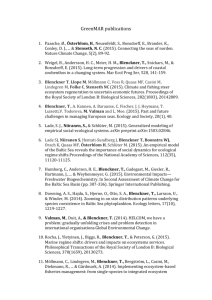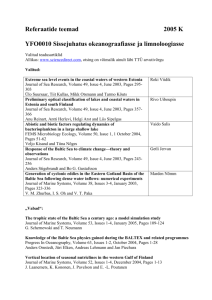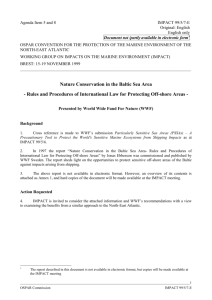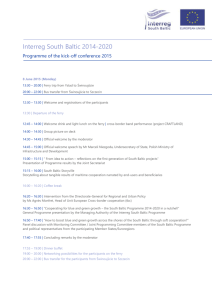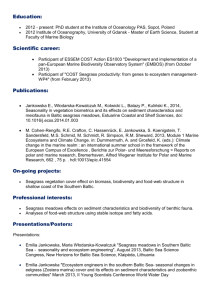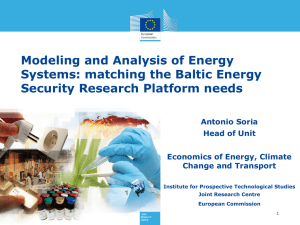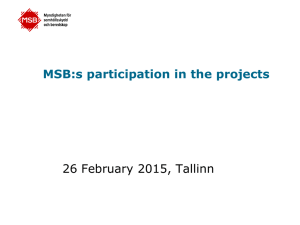GreenMAR publications Paasche, Ø., Österblom, H., Neuenfeldt, S
advertisement
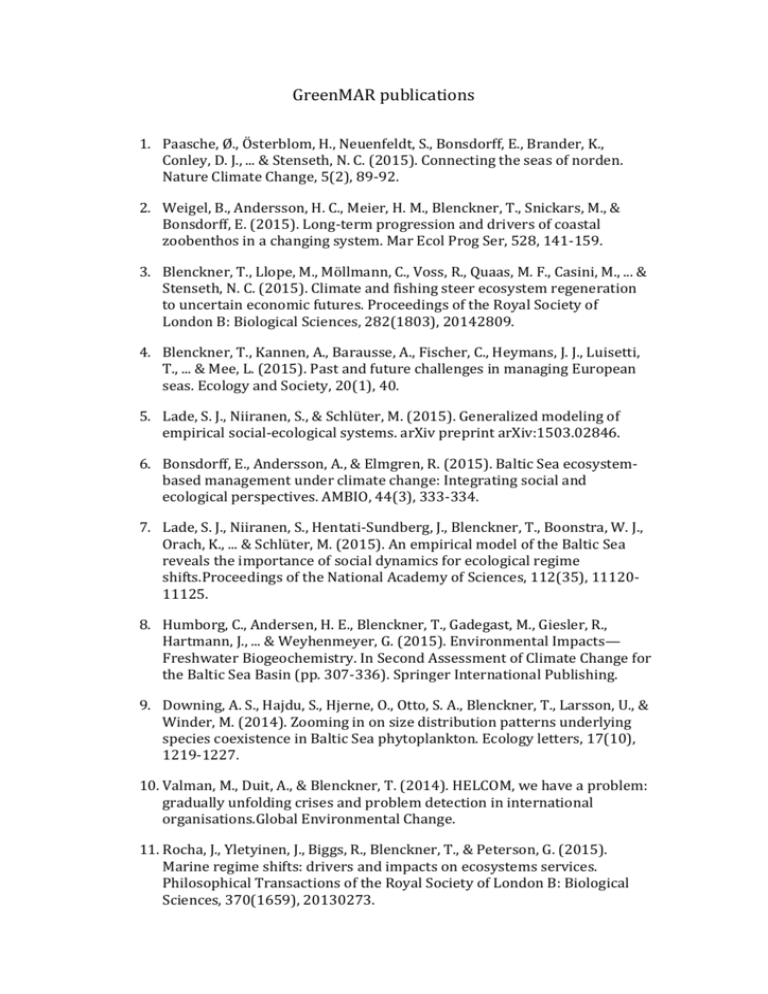
GreenMAR publications 1. Paasche, Ø., Österblom, H., Neuenfeldt, S., Bonsdorff, E., Brander, K., Conley, D. J., ... & Stenseth, N. C. (2015). Connecting the seas of norden. Nature Climate Change, 5(2), 89-92. 2. Weigel, B., Andersson, H. C., Meier, H. M., Blenckner, T., Snickars, M., & Bonsdorff, E. (2015). Long-term progression and drivers of coastal zoobenthos in a changing system. Mar Ecol Prog Ser, 528, 141-159. 3. Blenckner, T., Llope, M., Möllmann, C., Voss, R., Quaas, M. F., Casini, M., ... & Stenseth, N. C. (2015). Climate and fishing steer ecosystem regeneration to uncertain economic futures. Proceedings of the Royal Society of London B: Biological Sciences, 282(1803), 20142809. 4. Blenckner, T., Kannen, A., Barausse, A., Fischer, C., Heymans, J. J., Luisetti, T., ... & Mee, L. (2015). Past and future challenges in managing European seas. Ecology and Society, 20(1), 40. 5. Lade, S. J., Niiranen, S., & Schlüter, M. (2015). Generalized modeling of empirical social-ecological systems. arXiv preprint arXiv:1503.02846. 6. Bonsdorff, E., Andersson, A., & Elmgren, R. (2015). Baltic Sea ecosystembased management under climate change: Integrating social and ecological perspectives. AMBIO, 44(3), 333-334. 7. Lade, S. J., Niiranen, S., Hentati-Sundberg, J., Blenckner, T., Boonstra, W. J., Orach, K., ... & Schlüter, M. (2015). An empirical model of the Baltic Sea reveals the importance of social dynamics for ecological regime shifts.Proceedings of the National Academy of Sciences, 112(35), 1112011125. 8. Humborg, C., Andersen, H. E., Blenckner, T., Gadegast, M., Giesler, R., Hartmann, J., ... & Weyhenmeyer, G. (2015). Environmental Impacts— Freshwater Biogeochemistry. In Second Assessment of Climate Change for the Baltic Sea Basin (pp. 307-336). Springer International Publishing. 9. Downing, A. S., Hajdu, S., Hjerne, O., Otto, S. A., Blenckner, T., Larsson, U., & Winder, M. (2014). Zooming in on size distribution patterns underlying species coexistence in Baltic Sea phytoplankton. Ecology letters, 17(10), 1219-1227. 10. Valman, M., Duit, A., & Blenckner, T. (2014). HELCOM, we have a problem: gradually unfolding crises and problem detection in international organisations.Global Environmental Change. 11. Rocha, J., Yletyinen, J., Biggs, R., Blenckner, T., & Peterson, G. (2015). Marine regime shifts: drivers and impacts on ecosystems services. Philosophical Transactions of the Royal Society of London B: Biological Sciences, 370(1659), 20130273. 12. Möllmann, C., Lindegren, M., Blenckner, T., Bergström, L., Casini, M., Diekmann, R., ... & Gårdmark, A. (2014). Implementing ecosystem-based fisheries management: from single-species to integrated ecosystem assessment and advice for Baltic Sea fish stocks. ICES Journal of Marine Science: Journal du Conseil, 71(5), 1187-1197. 13. Viitasalo, M., Blenckner, T., Gårdmark, A., Kaartokallio, H., Kautsky, L., Kuosa, H., ... & Wikner, J. (2015). Environmental Impacts—Marine Ecosystems. InSecond Assessment of Climate Change for the Baltic Sea Basin (pp. 363-380). Springer International Publishing. 14. Elmgren, R., Blenckner, T., & Andersson, A. (2015). Baltic Sea management: Successes and failures. AMBIO, 44(3), 335-344. 15. Blenckner, T., Österblom, H., Larsson, P., Andersson, A., & Elmgren, R. (2015). Baltic Sea ecosystem-based management under climate change: Synthesis and future challenges. Ambio, 44(3), 507-515. 16. Selkoe, K. A., Blenckner, T., Caldwell, M. R., Crowder, L. B., Erickson, A. L., Essington, T. E., ... & Zedler, J. (2015). Principles for managing marine ecosystems prone to tipping points. Ecosystem Health and Sustainability, 1(5), art17. 17. Burgess, M. G., Diekert, F. K., Jacobsen, N. S., Andersen, K. H., & Gaines, S. D. (2015). Remaining questions in the case for balanced harvesting. Fish and Fisheries. 18. Kubisch, A., Winter, A. M., & Fronhofer, E. A. (2015). The downward spiral: eco‐evolutionary feedback loops lead to the emergence of ‘elastic’ ranges.Ecography. 19. Nicolas, D., Rochette, S., Llope, M., & Licandro, P. (2014). Spatio-temporal variability of the North Sea cod recruitment in relation to temperature and zooplankton. PloS one, 9(2), e88447. 20. Otto, S. A., Kornilovs, G., Llope, M., & Möllmann, C. (2014). Interactions among density, climate, and food web effects determine long-term life cycle dynamics of a key copepod. Marine Ecology Progress Series, 498, 73-U408. 21. Durant, J. M., Skern-Mauritzen, M., Krasnov, Y. V., Nikolaeva, N. G., Lindstrøm, U., & Dolgov, A. (2014). Temporal dynamics of top predators interactions in the Barents Sea. 22. Romagnoni, G., Mackinson, S., Hong, J., & Eikeset, A. M. (2015). The Ecospace model applied to the North Sea: Evaluating spatial predictions with fish biomass and fishing effort data. Ecological Modelling, 300, 5060. 23. Dunlop, E. S., Eikeset, A. M., & Stenseth, N. C. (2015). From genes to populations: how fisheries-induced evolution alters stock productivity.Ecological Applications. 24. Richter, A., & Dakos, V. (2015). Profit fluctuations signal eroding resilience of natural resources. Ecological Economics, 117, 12-21. 25. Boonstra, W. J., & Hentati‐Sundberg, J. (2014). Classifying fishers' behaviour. An invitation to fishing styles. Fish and Fisheries. 26. Boonstra, W. J., & Österblom, H. (2014). A chain of fools: or, why it is so hard to stop overfishing. Maritime Studies, 13(1), 1-20. 27. Watson, J. R., Stock, C. A., & Sarmiento, J. L. (2014). Exploring the role of movement in determining the global distribution of marine biomass using a coupled hydrodynamic–Size-based ecosystem model. Progress in Oceanography. 28. Varjopuro R., Andrulewicz, E., Blenckner, T., Dolch, T., Heiskanen, AS, Pihlajamäki, M., ... & Psuty, I. (2014). Coping with persistent environmental problems: systemic delays in Reducing eutrophication of the Baltic Sea.Ecology and Society, 19 (4), 48. 29. Valman, M., Österblom, H., & Olsson, P. (2015). Adaptive governance of the Baltic Sea-lessons from elsewhere. International Journal of the Commons, 9(1), 440-465. 30. Valman, M. (2014). Beliefs and behavior in international policymaking: longitudinal changes in the governance of the Baltic Sea. Environmental Policy and Governance. 31. Lade, S. J., Niiranen, S., Hentati-Sundberg, J., Blenckner, T., Boonstra, W. J., Orach, K., ... & Schlüter, M. (2015). An empirical model of the Baltic Sea reveals the importance of social dynamics for ecological regime shifts.Proceedings of the National Academy of Sciences, 112(35), 1112011125. 32. Meier, H. M., Andersson, H. C., Arheimer, B., Donnelly, C., Eilola, K., Gustafsson, B. G., ... & Zorita, E. (2014). Ensemble modeling of the Baltic Sea ecosystem to provide scenarios for management. Ambio, 43(1), 3748. 33. Daewel, U., Hjøllo, S. S., Huret, M., Ji, R., Maar, M., Niiranen, S., ... & van de Wolfshaar, K. E. (2014). Predation control of zooplankton dynamics: a review of observations and models. ICES Journal of Marine Science: Journal du Conseil,71(2), 254-271. 34. Schultz, L., Folke, C., Österblom, H., & Olsson, P. (2015). Adaptive governance, ecosystem management, and natural capital. Proceedings of the National Academy of Sciences, 112(24), 7369-7374. 35. Österblom, H., & Folke, C. (2015). Globalization, marine regime shifts and the Soviet Union. Philosophical Transactions of the Royal Society of London B: Biological Sciences, 370(1659), 20130278. 36. Eriksson, H., Österblom, H., Crona, B., Troell, M., Andrew, N., Wilen, J., & Folke, C. (2015). Contagious exploitation of marine resources. Frontiers in Ecology and the Environment, 13(8), 435-440. 37. Crona, B. I., Daw, T. M., Swartz, W., Norström, A. V., Nyström, M., Thyresson, M., ... & Troell, M. (2015). Masked, diluted and drowned out: How global seafood trade weakens signals from marine ecosystems. Fish and Fisheries. 38. Merrie, A., Dunn, D. C., Metian, M., Boustany, A. M., Takei, Y., Elferink, A. O., ... & Österblom, H. (2014). An ocean of surprises–Trends in human use, unexpected dynamics and governance challenges in areas beyond national jurisdiction. Global Environmental Change, 27, 19-31. 39. Troell, M., Naylor, R. L., Metian, M., Beveridge, M., Tyedmers, P. H., Folke, C., ... & de Zeeuw, A. (2014). Does aquaculture add resilience to the global food system?. Proceedings of the National Academy of Sciences, 111(37), 13257-13263. 40. Hentati-Sundberg, J., Hjelm, J., Boonstra, W. J., & Österblom, H. (2015). Management forcing increased specialization in a fishery system. Ecosystems,18(1), 45-61. 41. Österblom, H. (2014). Catching up on fisheries crime. Conservation Biology,28(3), 877-879. 42. Hentati-Sundberg, J., Hjelm, J., & Österblom, H. (2014). Does fisheries management incentivize non-compliance? Estimated misreporting in the Swedish Baltic Sea pelagic fishery based on commercial fishing effort. ICES Journal of Marine Science: Journal du Conseil, fsu036. 43. Norström, A. V., Dannenberg, A., McCarney, G., Milkoreit, M., Diekert, F., Engström, G., ... & Sjöstedt, M. (2014). Three necessary conditions for establishing effective Sustainable Development Goals in the Anthropocene.Ecology and Society, 19(3), 8. 44. Hinkel, J., Cox, M. E., Schlüter, M., Binder, C. R., & Falk, T. (2015). A diagnostic procedure for applying the social-ecological systems framework in diverse cases. Ecology and Society, 20(1). 45. Olafsson, S., Cook, D., Davidsdottir, B., & Johannsdottir, L. (2014). Measuring countries ׳environmental sustainability performance–A review and case study of Iceland. Renewable and Sustainable Energy Reviews, 39, 934-948. 46. Lomas, M. W., Bonachela, J. A., Levin, S. A., & Martiny, A. C. (2014). Impact of ocean phytoplankton diversity on phosphate uptake. Proceedings of the National Academy of Sciences, 111(49), 17540-17545. 47. Troell, M., Naylor, R. L., Metian, M., Beveridge, M., Tyedmers, P. H., Folke, C., ... & de Zeeuw, A. (2014). Does aquaculture add resilience to the global food system?. Proceedings of the National Academy of Sciences, 111(37), 13257-13263. 48. Arrow, K. J., Ehrlich, P. R., & Levin, S. A. (2014). Some Perspectives on Linked Ecosystems and Socio-Economic Systems. Environment and Development Economics: Essays in Honour of Sir Partha Dasgupta, 95. 49. Martın, P. V., Bonachela, J. A., Levin, S. A., & Munoz, M. A. (2015). Is it possible to elude catastrophic shifts?. 50. McCauley, D. J., Pinsky, M. L., Palumbi, S. R., Estes, J. A., Joyce, F. H., & Warner, R. R. (2015). Marine defaunation: Animal loss in the global ocean.Science, 347(6219), 1255641. 51. Pinsky, M. L., & Palumbi, S. R. (2014). Meta‐analysis reveals lower genetic diversity in overfished populations. Molecular ecology, 23(1), 2939. 52. Pinsky, M. L., & Byler, D. (2015, August). Fishing, fast growth and climate variability increase the risk of collapse. In Proc. R. Soc. B (Vol. 282, No. 1813, p. 20151053). The Royal Society. 53. Fuller, E., Brush, E., & Pinsky, M. L. (2015). The persistence of populations facing climate shifts and harvest. Ecosphere, 6(9), art153. 54. Klinger, D. H., Dale, J. J., Machado, B. E., Incardona, J. P., Farwell, C. J., & Block, B. A. (2015). Exposure to Deepwater Horizon weathered crude oil increases routine metabolic demand in chub mackerel, Scomber japonicus.Marine pollution bulletin, 98(1), 259-266. 55. Bonachela, J. A., Klausmeier, C. A., Edwards, K. F., Litchman, E., & Levin, S. A. (2015). The role of phytoplankton diversity in the emergent oceanic stoichiometry. Journal of Plankton Research, fbv087.
